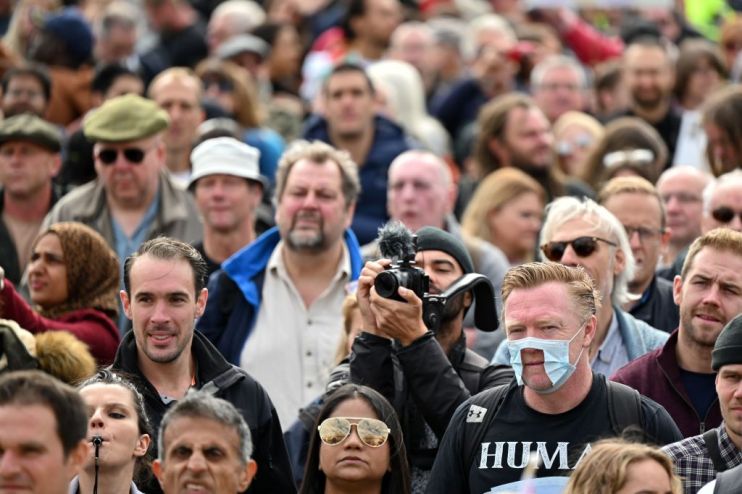Coronavirus: Leading UK scientists urge government to adopt herd immunity approach

A range of leading UK scientists have joined experts from around the world in calling for a herd immunity approach to the pandemic by forcing the vulnerable to shield while allowing others to return to normal life.
Launched in the US, The Great Barrington Declaration urges governments across the globe to scrap lockdowns in favour of “focused protection” for high-risk people, while granting full freedoms for less vulnerable people “until we reach herd immunity”.
The open letter has been signed by a coalition of almost 3,000 public health scientists and 4,000 medical practitioners, including leading experts from the universities of Oxford, UCL, Nottingham, Edinburgh, Exeter, Cambridge, Sussex and York.
The declaration states: “The most compassionate approach that balances the risks and benefits of reaching herd immunity, is to allow those who are at minimal risk of death to live their lives normally to build up immunity to coronavirus through natural infection, while better protecting those who are at highest risk.”
‘Irreparable damage’
The scientists caution that current lockdown measures are causing “irreparable damage” to the global economy and deepening wealth divides across nations.
The global economy is set to shrink by at least 5.2 per cent this year, according to forecasts from the World Bank — an estimate that would mark the deepest recession since the Second World War.
The UK, the US, Germany and Spain were all pushed to their worst recessions on record in the immediate wake of the coronavirus, with hopes for a V-shaped recovery on the line as the prospect of more lockdowns looms ahead.
The declaration also warned that current restrictions to curb a second wave of infections are having “devastating effects on short and long-term public health”.
It listed lower childhood vaccination rates, worsening cardiovascular disease outcomes, fewer cancer screenings and deteriorating mental health as side effects of current lockdown restrictions, warning that these could in turn lead to higher mortality rates in the future.
‘Wishful thinking’
However, other scientists have slammed the idea of global herd immunity as “wishful thinking”, adding that it ignores the effect of so-called long Covid and is unfair on vulnerable parts of the population.
Gregg Gonsalves, an epidemiologist at Yale University argued that herd immunity strategies amount to “culling the herd of the sick and disabled”, and described the defence of such an approach as “grotesque”.
Professor Jeremy Rossman, honorary senior lecturer in virology at the University of Kent, said the declaration “focuses only on the risk of death from Covid-19 but ignores the growing awareness of long Covid, that many healthy young adults with mild infections are experiencing protracted symptoms and long-term disability.”
Rossman added that “we still do not know if herd immunity is possible to achieve”, while many recent cases of re-infection occurring “suggests protective antibody responses may decay rapidly”.
Current restrictions ‘not working’
It comes as the UK government scrambles to contain a sharp spike in infections across the country, with politicians in virus hotspots warning that current coronavirus restrictions are “not working”.
A letter sent today to health secretary Matt Hancock warned that council leaders in Leeds, Manchester, Newcastle and Liverpool were “extremely concerned” about the sharp spike in cases across the North of England and the “national responses”.
“The existing restrictions are not working, confusing for the public and some, like the 10pm [curfew] rule, are counter-productive,” they said.
A further 14,542 coronavirus cases were reported in the UK yesterday, marking a 2,000 jump on Monday’s figure and taking the total number of confirmed cases to more than 530,000.
The rate of infection in parts of the country has now soared beyond the threshold of 20 cases per 100,000 used by the government to introduce quarantine measures on other countries.
Manchester reported 2,927 new cases in the seven days to 2 October — the equivalent of 529.4 cases per 100,000.
Meanwhile half of London’s 32 boroughs now have infection rates of more than 60 new cases per 100,000 people.
Redbridge in East London currently has the number of infections in the capital, after an outbreak of 286 new cases in the seven days to 2 October pushed its infection rate to 93.7.
London mayor Sadiq Khan yesterday called for greater measures to be imposed on the capital, warning: “Coronavirus is spreading quickly and widely across London, with the number of people hospitalised for the disease tripling in the past month.”
Before the Open: Get the jump on the markets with our early morning newsletter